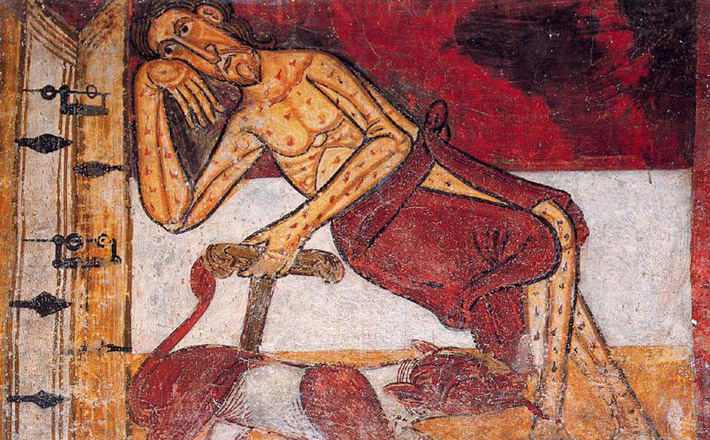Commentary on Psalm 146
Psalm 146 lacks any evidence of context, enabling the reader to hear it in her own time and place.
In the psalm God is the author of liberation (v. 7), the only one worthy of our trust (v. 3) and praise (v. 2). The psalmist knows these truths to be abiding and commits to a life of praise (v. 1).
The psalm contrasts the praiseworthy God with untrustworthy mortals. There is no other gap so wide. The psalmist singles out nobles, “princes” in the New Revised Standard Version (v. 3). This is an apt word in celebrity-obsessed culture. Wealth and standing do not make someone trustworthy.
Yet the psalmist is not engaging in class warfare, as is so often charged these days when one engages in serious cultural critique. The anonymous psalmist clarifies in the same verse that no mortal (literally “human child”) can offer any meaningful “help.” “Help” here is teshua; it is actually “salvation.” (This is an unfortunate translation choice since, when “help” reoccurs in v. 5, it is the word that actually means help.)
The two lines of verse 3 are in a parallel formation in which “princes” and “mortals” and “trust” and “help/salvation” correspond: Neither princes/nobles nor ordinary mortals are worthy of trust. They cannot help; they cannot save. Verse 4 proclaims that their plans—dreams and schemes—die with them.
Deepening the contrast between the ageless, undying God and time-bound mortals, the psalm proclaims the blessedness (or “happiness”) of those for whom Israel’s God is their help. This help, ezer, is the specialty of God. Throughout the Hebrew Bible God, not mortals, is the primary source of this help—one of the very few exceptions being the help the first woman in the garden is to provide her partner.
The psalmist calls the God who helps “the God of Jacob.” The title is introduced in Exodus 3, where it occurs in a longer formula with Abraham and Isaac in Exodus 3:6, 15, and then in 4:5. Subsequently, the expression “God of Jacob” stands alone as a divine title used more in the Psalms than anywhere else (see 2 Samuel 23:1; Psalm 20:1; 24:6; 46:7, 11; 75:9; 76:6; 81:1, 4; 84:8; 94:7; 114:7; 146:5; Isaiah 2:3; Micah 4:2).
In verses 6–9 the psalmist offers a curriculum vitae for God. This God is the God of liberation and social justice. The psalmist begins with the incomparable power of God as Creator juxtaposed with God’s faithfulness, in verse 6. The juxtaposition posits creation as an act of faithfulness. The rest of God’s mighty acts in the psalm are also acts of faithfulness:
- God does justice for the oppressed (v. 7). Biblical Hebrew has a deep lexicon of words that mean “to oppress,” at least 12 different words signaling kinds of oppression. This oppression, ashuqim, is primarily financial. It is characterized as defrauding one’s neighbor in Leviticus 6:2–4 and withholding wages in Deuteronomy 24:14. Financial fraud and wage theft are issues in our world as they were in the world of the psalmist.
- God is the one who gives food to the hungry (v. 7).
- God sets the prisoners free (v. 7).
- God opens the eyes of the blind (v. 8).
- God lifts up those who are bowed down (v. 8).
- God loves the righteous (v. 8).
- God watches over the strangers (v. 9). Strangers here are resident aliens, immigrants. Prosperous and stable nations around the world, particularly in the West, are struggling with immigration issues. In the face of these struggles, the psalmist declares that God is concerned for the immigrants.
- God upholds the orphan and the widow (v. 9). Widowhood was a common fate in the ancient world, and God and the Scriptures express a particular concern for widows and their children. In patriarchal perspective, fatherless children were orphans even if their mothers were very much alive. In the Hebrew Bible, orphans are nearly always paired with their widowed mothers. Throughout the Scriptures the ill-treatment of widows and their children is a mark of depravity, injustice, and oppression. Yet God and the Scriptures also use the threat of widowhood against men; their punishment for faithlessness includes their own deaths and the certain vulnerability of their widows and orphans, as in Psalm 78:62–64. An anonymous psalmist prays in this theology in Psalm 109, asking God to make his enemy’s wife a widow and his children orphans, fatherless. Some conservative Christians prayed this psalm against President Obama and marked merchandise with this sentiment.
- God brings the way of the wicked to ruin (v. 9).
This is quite the résumé. As is so often said in the Black Church: Who wouldn’t serve a God like this? The psalmist’s God is intimately concerned with the well-being of her people, particularly those who are the most vulnerable. Indeed, the psalm generally ignores those who defraud and oppress. The psalm also makes clear that these matters are not merely legal or criminal issues; they are moral, ethical, religious, and theological issues. And they are not beneath the notice of God.
One might be tempted to say these issues are claimed by God; they are her responsibility and not ours. Yet nothing in the psalm absolves humanity of or excuses us from addressing the issues of injustice in our world. Those for whom this text is Scripture have seen in it a pattern for their own service, from the prophets to Jesus of Nazareth.


September 25, 2016